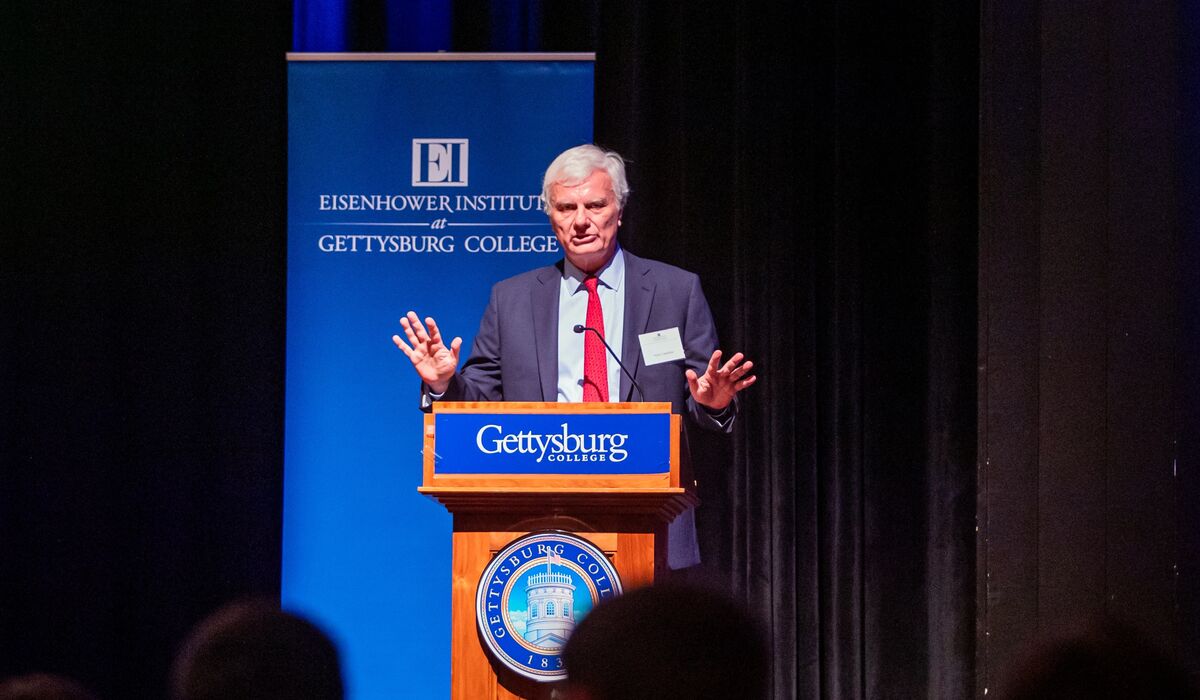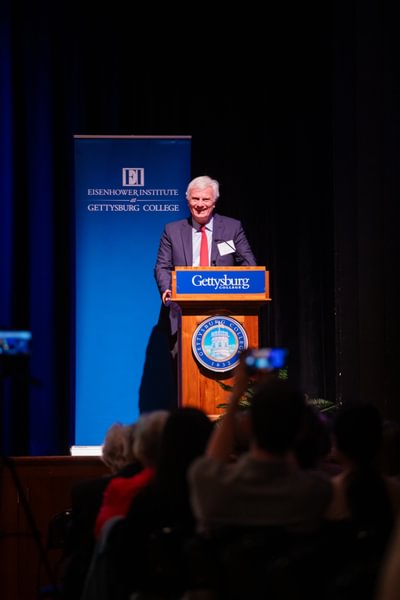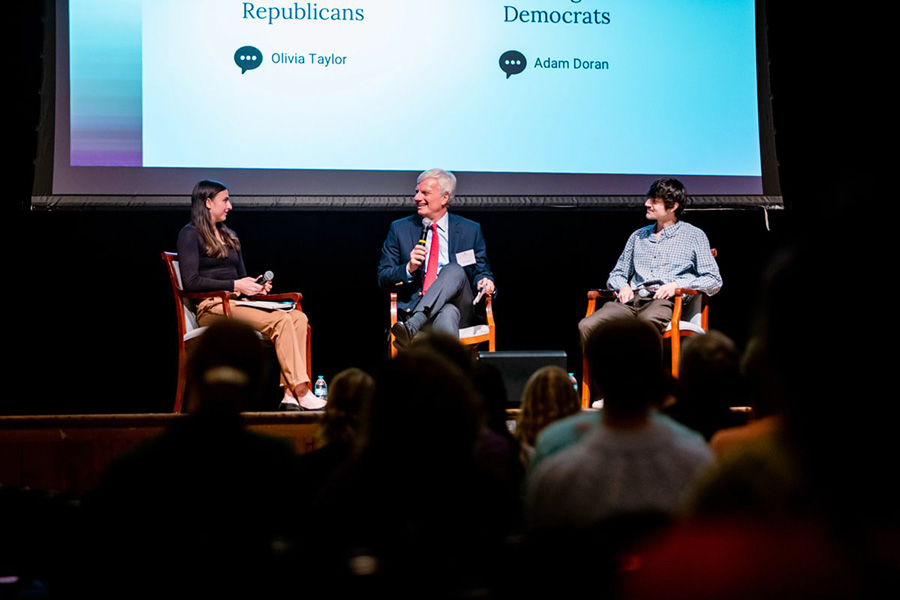
Through the Gettysburg Approach, students develop skills to critically analyze information, create opportunities to engage in dialogue across difference, and find bold solutions to address complex problems that plague society.
On the heels of a historic 2024 U.S. presidential election, Gettysburg College and the Eisenhower Institute welcomed Peter Canellos, managing editor at POLITICO, to speak at the 23rd Annual Blavatt Lecture held on Nov. 6 in the College Union Building Ballroom.
College students, faculty, and local community members gathered to hear Canellos comment on the evolving role of media in political campaigns. After his remarks, he engaged the audience through a Q&A discussion moderated by Adam Doran ’25 and Olivia Taylor ’25.
Empowered by the knowledge and experience gained over four decades as an editor and journalist at POLITICO and The Boston Globe, Canellos stressed the important roles varying forms of media, including published media and social media, can play in helping society sift through the important issues within political campaigns.
“It was a great opportunity to be able to hear Peter’s thoughts on the election as someone so intimately involved in the established media, an institution that he calls the fourth estate and is indeed a key part of the American political process,” noted Doran, a political science major and member of the College Democrats.

Inaugurated in 1996, the Blavatt Lecture brings to Gettysburg College individuals whose professional experiences provide a unique perspective on the American political system. The lecture is made possible by the generosity of Mr. and Mrs. Ronald Blavatt of Owings Mills, Maryland. Their sons graduated from Gettysburg College, as did their spouses: Jeffrey ’88 and Kelly Blavatt ’03 and Jason ’90 and Amy Blavatt ’91.
This year’s Blavatt Lecture took place less than 24 hours after President-elect Donald Trump’s victory over Vice President Kamala Harris in the U.S. presidential election. The event was part of Conversations for Change (C4C), a campus-wide initiative to promote open and constructive dialogue to address society’s most pressing challenges. As leaders of campus political groups with opposing views, Doran and Taylor worked together to engage with Canellos and the audience on a host of topics relevant to the recent election.
“Having Peter Canellos on campus in the wake of a major national election provided a much-needed opportunity for students to take a step back and reflect on the outcome of elections at both the national and state levels, and how exactly we got to where we are,” said Taylor, a history major and member of the College Republicans.
Following the Blavatt Lecture, Doran and Taylor reflected on the impact of Canellos’ insight into media and the current political atmosphere.
What were your expectations going into the lecture?
Adam Doran: “My expectations were high going into the lecture. Peter certainly met those expectations by making important points about the role of an independent media in the preservation of trust in democratic institutions and how this role has changed in the Information Age.”
Olivia Taylor: “Canellos focused his presentation largely on the evolving influence of the media, and the growing presence of social media. As young people, much of the political media we consume comes from places like social media, so this was undoubtedly an important and poignant topic to discuss.”
What were some of your key takeaways?
AD: “Much of the American political dynamic is dictated largely by perceptions of the economy, including those disseminated through variegate sources online. Thus, in our time of great economic change, including through automation and AI development, Trump achieved another presidential victory in large part by seizing on the economic anxieties of the country.”
OT: “What stood out most about this presentation was just how much media seems to have evolved. Canellos discussed the decline of local newspapers and the resulting ‘news deserts,’ which can lead to distrust in the media. As a young person who consumes a lot of information through social media, this presentation forced me to think deeply about how I synthesize the information I receive.”

How important is open dialogue on a college campus?
AD: “The importance of open dialogue—and perhaps especially immediately after elections—is of vital importance for fostering not only inquiring minds but civic virtue in the College community and wherever graduates may go.”
OT: “It is essential that we as students can engage in productive discourse, even when we don’t agree. This has been the entire mission of the Conversations for Change initiative, and this mission is one that we should keep in mind even now that the election season is over.”
Where do we go from here as a nation?
AD: “Americans who want to see a less polarized America should always keep in mind that the media, whether it be the established news media or social media, will always play a crucial role in our politics. Anyone who fears news subjectivity, ‘infotainment’, and the spread of disinformation within media should look beyond established news networks. It is important that we as a nation not only figure out how to bridge the divide between large partisan news networks, but also figure out how to create a more truth-valuing media in America as a whole that can last through political, social, or even technological change.”
OT: “Regardless of who you voted for, and whether or not this election went the way you wanted, remember that we are all human. The more we search for common ground and seek to understand one another, the more we will realize that we really aren’t quite so divided. Being able to work together, across differences, is how we as a nation will be able to begin to work past the deep divisions and rifts in our society. The media can be a useful tool in this process as we work to rebuild trust in the government and the electoral process once again. As we know, however, it can also be harmful, so we should proceed with cautious optimism.”
Learn how Gettysburg is promoting open dialogue and civil discourse through Conversations for Change
Related Links:
External Links:
By Corey Jewart
Photo courtesy of Abbey Frisco
Posted: 11/26/24